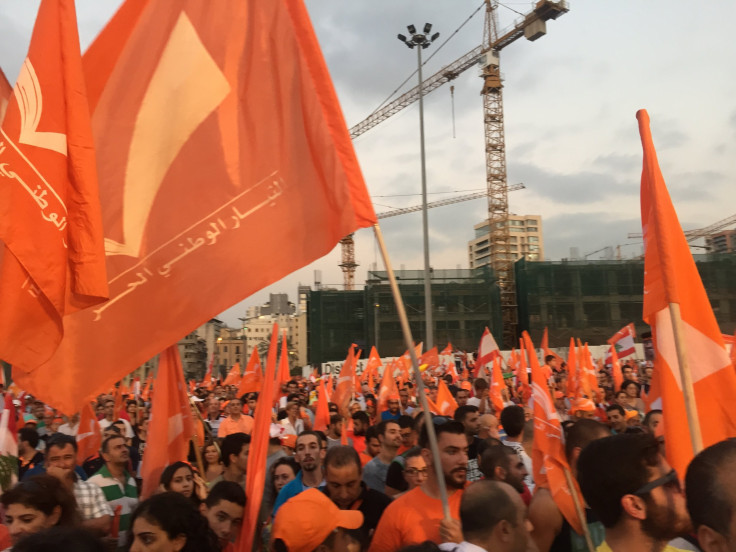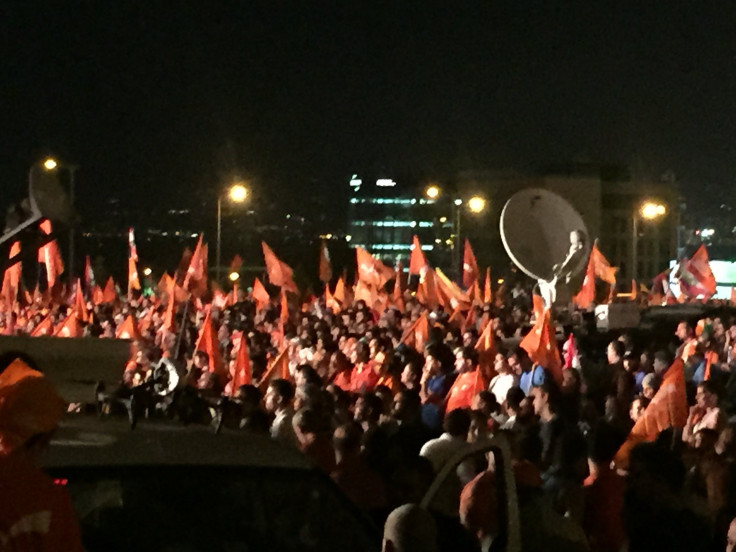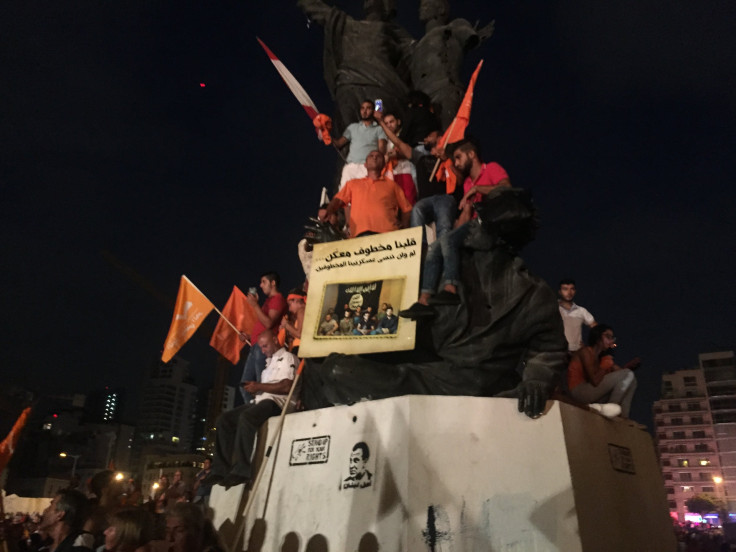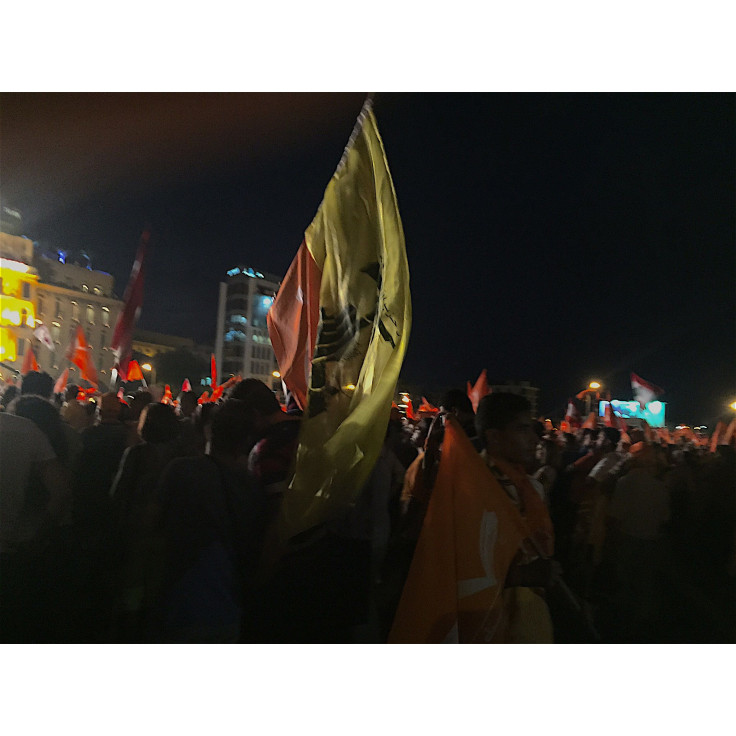Lebanon's Security, And Old Political And Religious Alliances Divide Beirut's Trash Demonstrations

BEIRUT -- High school teacher Johnny al-Kattar was one of thousands who took to Beirut’s garbage-ridden streets last month, many of them holding the cedar-emblazoned flag of Lebanon. They were protesting the corrupt government-run waste removal system, in one of the most secular and civilian-led demonstrations the country has seen in years.
Beirut’s so-called YouStink campaign briefly seemed to unify the deeply factionalized city, but when activists began to assign blame for the crisis, the movement splintered along age-old political and religious lines. Al-Kattar himself traded his Lebanese flag for the orange and white flag of the Freedom Liberation Movement (FPM), the Christian political party he’d essentially been assigned to at birth by his religion, his parents and his hometown.
That outcome didn’t surprise him. “Lebanon is an unchangeable country. No revolution can alter anything,” al-Kattar told International Business Times. “Same rulers, different faces.”
The growing garbage piles and continual electricity blackouts plaguing Beirut this summer are the most visible signs of a broader failure of leadership in a country that hasn’t had a president in more than a year and is becoming increasingly embroiled in the Syrian conflict next door.

The YouStink campaign began after Beirut’s biggest landfill closed when politicians could not agree on revenue allocation. Protests from one group or another have been taking place almost daily in Beirut and not even the exhausting heat or blinding sandstorms quieted demonstrations.
Days after the rallies began, protesters began attacking what YouStink activist Lucien Bourjeily called the “octopus of corruption” in parliament. The campaign has accused politicians, including those in the FPM, of trying to undermine the campaign by using their media outlets to threaten activists and spread rumors about the group.
“People are hearing so much untruthful information,” said Bourjeily, a Lebanese theater producer and social activist and one of the first organizers for the YouStink movement. “We were not ready to face this corruption because we are just citizens. We don’t have a media outlet.”
Threatened by a secular uprising, some political parties shifted their rhetoric, organizing their own rallies and urging their supporters to abandon YouStink’s inclusive notions for their old sectarian alliances, Bourjeily said. (The political system in Lebanon is divided according to sect, and most major parties have a religious affiliation.)
Updates from the anti-trash movement in #Lebanon. Follow our post: http://t.co/DhSNncOEnK #YouStink #طلعت_ريحتكم pic.twitter.com/hemt7etrby
— Mashallah News (@MashallahNews) August 30, 2015“YouStink got people from all parties to come, but when the partisans of a political party are called upon by their leader, they still go because they are worried that they are threatened by other parties,” said Bourjeily. “It’s a show of force to say ‘We’re still here. We exist.’”
Al-Kattar said: “At first we thought it would be a chance for everyone to stand up as Lebanese without any parties interfering,” adding: “I left because I saw they were playing on people's emotions… it was a chaos.”
The campaign's demand that the parliament, which extended its term last November until 2017, hold immediate general elections caused another split among protesters.
One splinter group, the We Want Accountability campaign, has ties to the Lebanese Communist Party, the People’s Movement and the Syrian Social Nationalist Party, and is calling for a complete revamp of the country’s political system and a secular election.
A secular election in Lebanon would mean overhauling the country’s entire sectarian-based voting system. Such a major political change, some feared, would be too radical and destabilizing for the country to handle in its current state.
Several FPM members who participated in the early YouStink protests became wary of the campaign’s political goals, worried about Lebanon’s security.

“We’re not against them but we are afraid that if we follow them they will ask the government to resign and then we won’t have a leader,” said Diala Debs, a 23-year-old unemployed graduate.
“We don’t want an Arab Spring,” said Yara Nasr, a 23-year-old studying advertising, who also had abandoned the YouStink protests when they turned political.
This fear is shared by many Lebanese civilians who witnessed both the 2006 civil war and the string of Arab Spring protests in 2011 that toppled governments across the region. Lebanon is now deeply embroiled in the Syrian conflict, and being without a legitimate government could make the country more vulnerable to militants from the group also known as the Islamic State group, or ISIS, and al-Qaeda’s Jabhat al-Nusra.
On Friday, Debs and Nasr were two of the thousand protesters at an anti-government corruption and trash rally organized by and for the FPM on Friday.
Demonstrators flaunted the party’s bright orange insignia on everything from shoes to flagpoles. A handful of yellow could be seen where some supporters had tied the flag of Shiite armed political group Hezbollah to the orange FPM banner.
The FPM's previous leader and founder is former Lebanese military General Michel Aoun, who, according to the two women, is the only politician who will rid the parliament of corruption and protect Lebanon. Aoun is also Hezbollah’s preferred presidential candidate. Hezbollah has been actively fighting ISIS and Nusra alongside the Lebanese army, which has helped them gain support from non-Shiite Lebanese citizens who feel threatened by the militants.
“I feel safe with Hezbollah because they are protecting the Christians and all Lebanese,” said Roland al-Kattar, a 27-year-old bank employee.

Although the FPM has a very similar platform to the sectarian movement -- better infrastructure with less corruption -- YouStink is not convinced that the party has honorable intentions. FPM has ministers in the current Lebanese parliament, and Aoun recently appointed his son-in-law, Gibran Bessil, as the party’s political leader, instead of holding an election.
The FPM rally was held just days before the parliament meets Wednesday for discussions about their next steps in hopes of boosting the party’s chances at getting a president elected. YouStink activists have organized nationwide protests at the same time. The outcome of Lebanon’s trash demonstrations is still unclear, but all sides are committed to its continuation, and convinced that their solution is the right one.
“Everything in Lebanon that even started to scratch the surface of this corruption has been destroyed but they haven’t been able to destroy us,” Bourjeily said. “We will continue.”
© Copyright IBTimes 2024. All rights reserved.






















